Thursday, April 05, 2007
Canadian Creative Commons Licence Case
Blogs are currently abuzz with the news that a Canadian photographer, "Mr Spatial Mongrel from Kamloops BC"(aka David Wise) is alleging that Betty Hinton MP is in violation of the Canadian CC Attribution-ShareAlike licence that he released one of his photographs under. Hinton included the photographs in a newsletter and Wise states he would have not permitted Hinton to use the pic as it was not attributed and "because he disagrees with "her campaign and political viewpoint"".
Andres Guadamuz has an excellent analysis of the case over at Technollama, and concludes "I do hope we get a case out of this, as it would be interesting for many different reasons. So, in other words, "fight, fight, fight!"" I have to agree. This type of case, combined with the Viacom v. YouTube case tend to have us intellectual property-types foaming at the mouth, waiting to see what will happen next. Sad, but true.
Hat tip: Technollama and Michael Geist.
Andres Guadamuz has an excellent analysis of the case over at Technollama, and concludes "I do hope we get a case out of this, as it would be interesting for many different reasons. So, in other words, "fight, fight, fight!"" I have to agree. This type of case, combined with the Viacom v. YouTube case tend to have us intellectual property-types foaming at the mouth, waiting to see what will happen next. Sad, but true.
Hat tip: Technollama and Michael Geist.
Labels: cases, catherine, Creative Commons
Wednesday, March 14, 2007
What does this data mean?
In June last year, I presented a paper at the Unlocking IP conference, part of which involved collecting data on Australian usage of Creative Commons licences. For example, here's the data I collected in June 2006, organised by licence attribute:
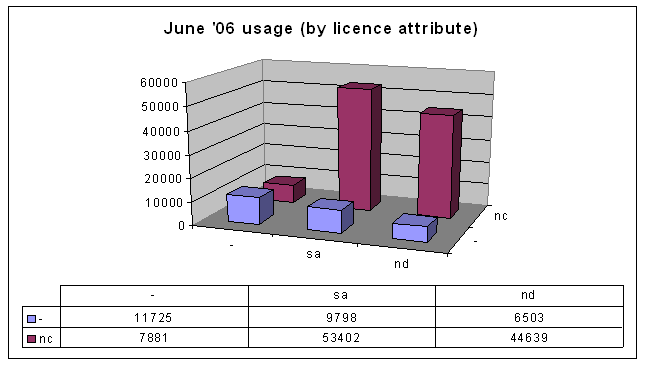 It shows that most people are using the Non-Commercial licences and restricting derivative works.
It shows that most people are using the Non-Commercial licences and restricting derivative works.
That was all well and good, but then this year I revised my paper for publication in SCRIPT-ed. I wasn't going to gather the data all over again, but then I remembered that Australia now has version 2.5 Creative Commons licences, and I guessed (correctly) that the numbers would be big enough to warrant being included in the paper. Here's the data from March 2007:
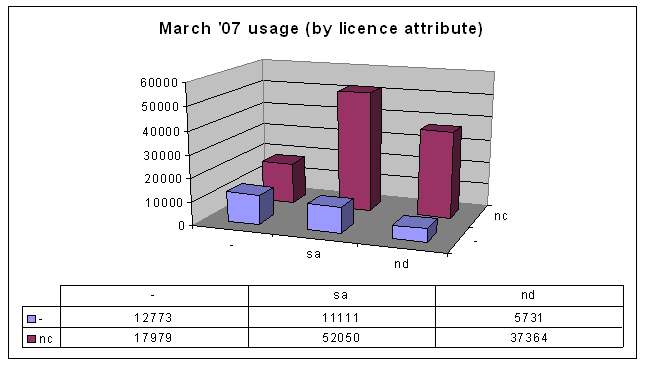
Matrix subtraction
I admit that it looks about the same, but it gets interesting when you subtract the old data from the new data, to find the difference between now and mid-2006:
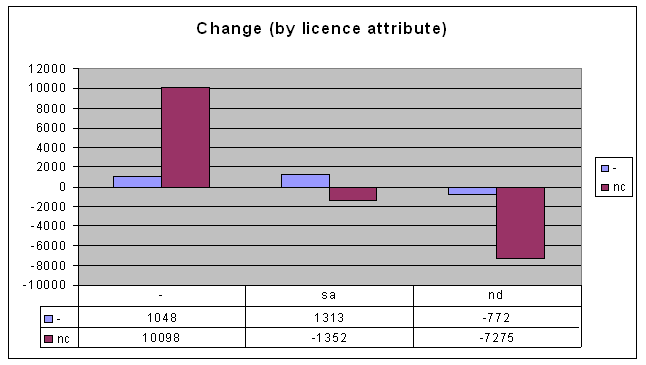 So here's my first conclusion, from looking at this graph:
So here's my first conclusion, from looking at this graph:
The jurisdiction/version dimension
Another way of looking at the data is by jurisdiction and version, instead of by the licences' attributes. Here's the data from June 2006, organised this way:
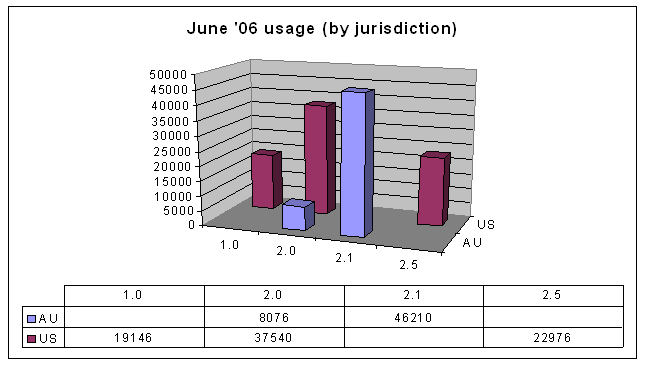 First, note that there was no data (at the time) for Australian version 1.0 and 2.5, and US version 2.1 licences. This is simply because not all jurisdictions have all licence versions.
First, note that there was no data (at the time) for Australian version 1.0 and 2.5, and US version 2.1 licences. This is simply because not all jurisdictions have all licence versions.
Some people might be wondering at this stage why there are Australian web sites using US licences. I believe the reason is that Creative Commons makes it very easy to use US (now generic) licences. See http://creativecommons.org/license/, where the unported licence is the default option.
The previous graph, also, is not particularly interesting in itself, but compare that to the current data:
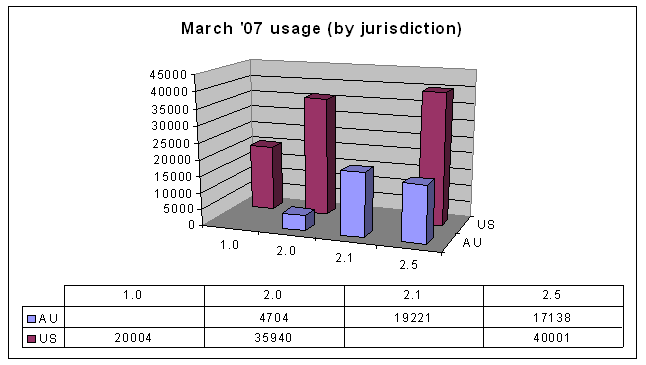
The move away from Australia version 2.1
You can see straight away that there's lots of change in the 2.1 and 2.5 version licences. But take a look at the change over the last 9 months:
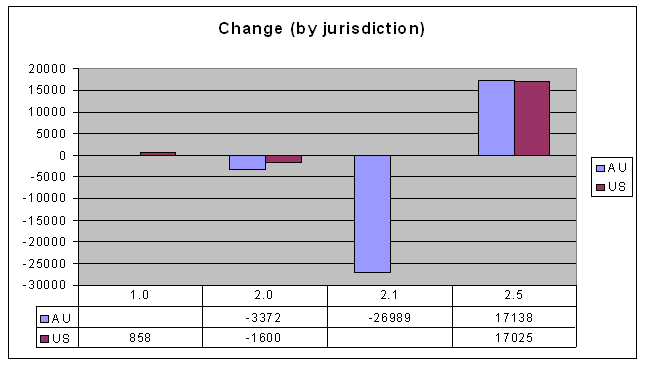 Can that be right? Australian usage of both US and Australian version 2.5 licences has increased as expected (because they are current). But why would the usage of Australian 2.1 licences go down? And by more than the amount of new usage of Australian 2.5 licences? Here are some possibilities:
Can that be right? Australian usage of both US and Australian version 2.5 licences has increased as expected (because they are current). But why would the usage of Australian 2.1 licences go down? And by more than the amount of new usage of Australian 2.5 licences? Here are some possibilities:
Methodology
For the record, here's how I collected the data. I did the following Yahoo searches (and 36 others). For each search, Yahoo tells you "about" how many pages are found.
Last word
You can see a graph of the change in usage for every licence for every version and both jurisdictions here.
That was all well and good, but then this year I revised my paper for publication in SCRIPT-ed. I wasn't going to gather the data all over again, but then I remembered that Australia now has version 2.5 Creative Commons licences, and I guessed (correctly) that the numbers would be big enough to warrant being included in the paper. Here's the data from March 2007:
Matrix subtraction
I admit that it looks about the same, but it gets interesting when you subtract the old data from the new data, to find the difference between now and mid-2006:
- People are moving away from Attribution-NonCommercial-NoDerivs licences and towards Attribution-NonCommercial licences. I.e. people are tending towards allowing modifications of their works.
The jurisdiction/version dimension
Another way of looking at the data is by jurisdiction and version, instead of by the licences' attributes. Here's the data from June 2006, organised this way:
Some people might be wondering at this stage why there are Australian web sites using US licences. I believe the reason is that Creative Commons makes it very easy to use US (now generic) licences. See http://creativecommons.org/license/, where the unported licence is the default option.
The previous graph, also, is not particularly interesting in itself, but compare that to the current data:
The move away from Australia version 2.1
You can see straight away that there's lots of change in the 2.1 and 2.5 version licences. But take a look at the change over the last 9 months:
- Some people who were using AU-2.1 licences have switched to AU-2.5, and some have switched to US-2.5 (the latter's a little hard to understand, though).
- The AU-2.1 licence usage has gone down independent of the new licences. It could even be that most of the licences were actually not real licensed works, but, for example, error messages on a web site that has a licence stamp on every page. If the web site is inadvertently exposing countless error messages, when the problem is fixed it could involve this kind of correction.
- Or my original data could have just been wrong. I know it's not cool to suggest this kind of thing: "my data? My data! There's nothing wrong with my data!" Well, even then, it could be that my methods have significant variability.
Methodology
For the record, here's how I collected the data. I did the following Yahoo searches (and 36 others). For each search, Yahoo tells you "about" how many pages are found.
- Australian use of AU-by version 2.5
- Australian use of AU-by-sa version 2.5
- Australian use of AU-by-nd version 2.5
- Australian use of AU-by-nc version 2.5
- Australian use of AU-by-nc-sa version 2.5
- Australian use of AU-by-nc-nd version 2.5
Last word
You can see a graph of the change in usage for every licence for every version and both jurisdictions here.
Labels: ben, Creative Commons, data
Wednesday, February 21, 2007
New Literature on Creative Commons and Orphan Works
I've been away from the House of Commons for a while, but it's good to be back with my housemates Ben and Abi. It's also been good to come back and have a read of some of the new literature that's been emerging about the issues we discuss on this blog. I just wanted to highlight two papers that are worth a read and are accessible via the Australian Copyright Council's website. Both are by Ian McDonald, a Senior Legal Officer at the Copyright Council, and can be found either here or in the Copyright Reporter.
The first is "Some Thoughts on Orphan Works", an issue that's been discussed on our blog quite a lot in the past. McDonald gives a very comprehensive overview of what's been going on to address the orphan works issue both in Australia and overseas. This article also appears in the October 2006 issue of the Copyright Reporter. (Yes, I know there's a lapse between the release of this article and my blogging about it, but everything from about September last year passed by in a blur due to the Copyright Amendment Act!)
The second is titled "Creative Commons: Just Say 'CC'?" In this article, McDonald covers some of the criticisms of the Creative Commons licensing regime that he's discussed in the past and have also been raised a few times by Niva Elkin-Koren and Kim Weatherall in similar papers. This article was in the December 2006 issue of the Copyright Reporter.
I'm really enjoying writing my thesis on the copyright commons but covering all the relevant literature certainly keeps me busy!
The first is "Some Thoughts on Orphan Works", an issue that's been discussed on our blog quite a lot in the past. McDonald gives a very comprehensive overview of what's been going on to address the orphan works issue both in Australia and overseas. This article also appears in the October 2006 issue of the Copyright Reporter. (Yes, I know there's a lapse between the release of this article and my blogging about it, but everything from about September last year passed by in a blur due to the Copyright Amendment Act!)
The second is titled "Creative Commons: Just Say 'CC'?" In this article, McDonald covers some of the criticisms of the Creative Commons licensing regime that he's discussed in the past and have also been raised a few times by Niva Elkin-Koren and Kim Weatherall in similar papers. This article was in the December 2006 issue of the Copyright Reporter.
I'm really enjoying writing my thesis on the copyright commons but covering all the relevant literature certainly keeps me busy!
Labels: catherine, Creative Commons, orphan works
Monday, January 08, 2007
Lawrence Lessig On The West Wing (Well, Sort of...)
This may be old news to some, but here Down Under we're only just getting to see Season 6 of the TV show The West Wing, so I thought this would be a good post for local readers. In tonight's (January 8, 8.30pm, ABC) episode actor Christopher Lloyd portrays Lessig in a Constitutional-drafting storyline. Turns out a student from Lessig's Constitutional Law class at Harvard ended up writing for The West Wing...Lessig told the story in class...and the story appeared on The West Wing.
See the details on Wikipedia here and at Lessig's blog here (the fact that Lessig's blogpost about the episode was written in February 2005 serves to further illustrate how far behind we really are.) The ABC also has a description here, with Lessig getting a mention. How surreal it must be to see your name intermixed with fictional characters...
Just in case you’re wondering, if the housemates were ever portrayed by actors, I believe these fine artists would do us justice: Sarah Michelle Gellar (myself), Johnny Depp (Ben) and Australia’s own Bollywood queen Tania Zaetta (Abi).
See the details on Wikipedia here and at Lessig's blog here (the fact that Lessig's blogpost about the episode was written in February 2005 serves to further illustrate how far behind we really are.) The ABC also has a description here, with Lessig getting a mention. How surreal it must be to see your name intermixed with fictional characters...
Just in case you’re wondering, if the housemates were ever portrayed by actors, I believe these fine artists would do us justice: Sarah Michelle Gellar (myself), Johnny Depp (Ben) and Australia’s own Bollywood queen Tania Zaetta (Abi).
Labels: catherine, Creative Commons, Fun
Friday, December 22, 2006
Creative Commons in Our Local, The Sydney Morning Herald
The Sydney Morning Herald (our local read here in, well, Sydney and a great way of procrastinating, when we're not dilligently writing blog posts) has picked up the Creative Commons "changing of the guard" from Lessig to Joi Ito. (See our post about it here) According to the piece, CC is "trying to make a greater push to the commercial arena".
Read the article here, and credit must go to Peter Black at Freedom to Differ for being very quick off the mark in picking these things up.
It's great to be reading about Creative Commons in our local media, although I have to admit I was slightly stunned when I saw the words "Creative Commons" and "Sydney Morning Herald" in the same sentence and briefly wrote it down to a Christmas/sugar-induced hallucination. Admittedly, the article is an AP report, but kudos to the SMH for picking it up.
The article describes Creative Commons as pushing "copyright lite", a term which I will be sure to include in my thesis (as it will be the only time I can get away with including the word 'lite' in a doctoral thesis.)
Read the article here, and credit must go to Peter Black at Freedom to Differ for being very quick off the mark in picking these things up.
It's great to be reading about Creative Commons in our local media, although I have to admit I was slightly stunned when I saw the words "Creative Commons" and "Sydney Morning Herald" in the same sentence and briefly wrote it down to a Christmas/sugar-induced hallucination. Admittedly, the article is an AP report, but kudos to the SMH for picking it up.
The article describes Creative Commons as pushing "copyright lite", a term which I will be sure to include in my thesis (as it will be the only time I can get away with including the word 'lite' in a doctoral thesis.)
Labels: catherine, Creative Commons
Sunday, December 17, 2006
Lessig Steps Down...
Lawrence Lessig has stepped down as chairman of Creative Commons. Joi Ito will take over this role, but Lessig will remain CEO of the open content licensing organisation.
See the Freedom to Differ post with more information and links here.
See the Freedom to Differ post with more information and links here.
Labels: catherine, Creative Commons
Thursday, December 14, 2006
Free Beer Anyone?

"Free software is a matter of liberty, not price. To understand the concept, you should think of free as in free speech, not as in free beer." (Richard Stallman, Free Software Definition)December 15 2006 is the fourth anniversary of Creative Commons. What is the best way to celebrate? With a cool refreshing glass of free beer of course!
What is free beer? It is promoted as "beer which is free in the sense of freedom, not in the sense of free beer." The project is the brain-child of a Copenhagen based artist collective called Superflex and a group of students at a Copehagen IT University. The underlying idea involves the application of free software/open source principles to a tangible item (close to the heart of many) - namely beer.
How do they go about it? The branding and recipe is released under a Creative Commons (Attribution-Sharealike) license. This means that anyone is free to produce and sell the beer and brew their own modified version of the beer, as long as they share the modified recipe. The recipe for Free Beer version 3.0 (codename: "Skands") is available here.
Lawrence Lessig rightly points out that recipes are not copyrightable. But I wonder- does this matter when it is the best beer you have had all year?
Richard Stallman seems to like the idea but unfortunately, does not drink beer.
Anyway, if you happen to be wondering around Blågårdsgade 5, Copenhagen on the 15th of December why not put on your dansende schoenen and join in the festivities for the fourth anniversary of Creative Commons. Creative Commons Denmark and the folks from Free Beer will be there. If that isn't enough enticement remember- Free Beer is now available on tap.
(Pictured: "My glass of beer", Lupinanto-Antonio Pennisi, available under a Creative Commons Attribution-NonCommercial-NoDerivs 2.0 License)
Labels: abi, Creative Commons, Fun
Thursday, December 07, 2006
Adiós Creative Commons?
The legal validity of Creative Commons licenses in Spain have been questioned in a recent court decision.
Read more here in a post by Andres Guadamuz.
Read more here in a post by Andres Guadamuz.
Labels: abi, Creative Commons

